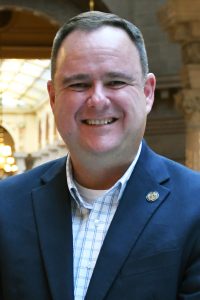Subscriber Benefit
As a subscriber you can listen to articles at work, in the car, or while you work out. Subscribe NowAfter the pro bono filing fee bill failed to get even a hearing last year, two bills extending the life of the $1 surcharge have passed through their respective chambers this year as the 2022 session of the Indiana General Assembly gets to the midway mark.
Senate Bill 241, authored by Sens. Kevin Boehnlein and Eric Koch, and House Bill 1260, an omnibus local government finance bill authored by Rep. Daniel Leonard, would keep the funds flowing to support pro bono efforts in Indiana. The main difference between the bills is the sunset date for the filing fee: The Senate bill would keep the fee in place until July 1, 2025, while the House measure would extend the fee indefinitely.
Money from the filing fee is passed to the Indiana Bar Foundation, which uses the funds to support the Indiana Pro Bono Network, which trains and pairs volunteer attorneys with low-income Hoosiers who need assistance with civil legal matters.
Both bills passed on third reading with strong bipartisan support and are moving forward.

“We have places in our state where indigent care can go wanting if we don’t have a process in place like this,” Boehnlein, R-Greenville, said of pro bono services. “Although I’m not a fan of the government intervening in private matters, I think this is a good balance between a public and private partnership … to say, ‘You know what, we’re not going to allow indigent people to not receive the kind of services they need at the local level, at least for a period of time.’”
The Legislature added the extra $1 fee on civil filings in 2012 to help replace the money lost when interest rates flatlined and the return on the Interest on Lawyers’ Trust Accounts, or IOLTA, dropped dramatically.
A fiscal analysis by the Legislative Services Agency found that as recently at 2019, the fee garnered $368,275 for pro bono services, but the amount declined in 2021 to $291,596 because the pandemic depressed civil filings.

“It doesn’t maybe sound like it’s a lot of money, but in the scope of civil legal assistance, it is a significant amount of money,” Charles Dunlap, executive director of the Indiana Bar Foundation, said, noting the filing fee revenue is about a third of the $1 million distributed to the pro bono network every year. “That base of support and the work that Pro Bono Indiana does in delivering and coordinating pro bono legal service delivery is crucial for Indiana.”
The filing fee funds are used to support the work of Pro Bono Indiana, which includes tasks such as handling the intake and screening of individuals seeking help. Legal services are provided free of charge to the clients and none of the filing fee is used to pay the volunteer lawyers.
One of the original authors of the filing fee legislation and a continued champion of pro bono work was Sen. Ron Grooms, who resigned near the end of 2021. He endorsed Boehnlein to fill his seat, and in return the new legislator introduced the bill that the Jeffersonville Republican had long carried.
During the 2021 session, Grooms offered SB 253, which would have increased the filing fee to $3 and eliminated the expiration date. However, the bill was never given a hearing in the Senate Judiciary Committee.
Boehnlein’s bill went back to the original language, keeping the fee at a dollar and establishing a sunset date.
“I think there were those who wanted to make this permanent in terms of fee for service, but what we did is we put another sunset clause on it for two years, and that seems to placate those who were having some anxiety about supporting it,” Boehnlein said. “… The sunset is a reasonable, I think, remedy to give folks who were maybe concerned this might go on forever.”
This year, SB 241 was passed unanimously by the Senate Judiciary Committee. Then it was handed over to the Senate Tax and Fiscal Policy Committee, where it also received unanimous support.
“Our hope is ultimately either in an amended version in the Senate or in conference (committee) or some way that we will come out with an elimination of the sunset,” Dunlap said. “That’s our goal, but certainly an extension of the sunset is welcome, as well.”
If neither bill is signed into law, the $1 fee will stop July 1, 2022.
In the House, Leonard’s bill was approved by a 92-3 vote and has been assigned to the Senate Appropriations Committee.
The upper chamber took a detour on its way to approving SB 241. Because Boehnlein is a new senator and SB 241 was his first bill to reach the floor on third reading, he had to endure a little hazing from his colleagues before the measure was passed.
Sen. R. Michael Young, who is a co-sponsor of the bill and voted for it in committee, pressed Boehnlein on the cost charged for filing a legal action in court filing and asserted, “You come here as a new legislator and the first thing you do is you tax the poor by keeping a dollar fee on it.”
The new senator was prepared, starting to answer, “No sir, this is actually in response to helping … ” before the veteran senator cut him off. “Because we’re limited on time today, you are very fortunate,” Young said while the other senators applauded.
Then during the voting, several senators first voted “no” before switching to “yes.” The bill passed 46-2, which included Young’s vote in support.
Afterward, Dunlap explained that in a “vast majority of situations” low-income Hoosiers would not pay the filing fee. Most often, they are the defendants and, therefore, would not pay the fee to initiate the civil lawsuit.
The $1 filing fee, Dunlap said, represents 1% or less of the overall civil filing fee.
The surcharge, he continued, “helps all Hoosiers by helping to increase the efficiency of the courts by reducing the number of self-represented litigants and helping protect the legal rights of low-income Hoosiers, as well.”
Please enable JavaScript to view this content.
